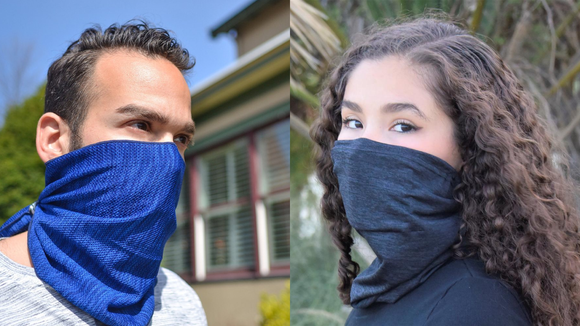Anti-COVID-Contagion Mask Efficacy
"We confirmed that when people speak, small droplets get expelled, so disease can be spread by talking, without coughing or sneezing." "We could also see that some face coverings performed much better than others in blocking expelled particles." "We certainly encourage everyone to wear a mask, but we want to make sure that when you wear a mask and you go to the trouble of making a mask, you make one, or wear one that actually helps not just you, but helps everyone." Martin Fischer, associate research professor, Duke University, North Carolina
"If everyone wore a mask, we could stop up to 99 percent of these droplets before they reach someone else." "About half of infections are from people who don't show symptoms, and often don't know they're infected. they can unknowingly spread the virus when they cough, sneeze and just talk." "They [some types of masks tested] were no good. The notion that 'anything is better than nothing' didn't hold true." Eric Westman, associate professor of medicine, Duke University
 |
| Shutterstock/Golden Shrimp |
It was when Dr.Westman began an association with a local non-profit to obtain masks from them to enable him to provide free masks to people who need them, that the idea for a study, published online this month in the journal Science Advances, came about. He was curious about which masks would be the most effective, wanting to be certain he wouldn't be providing people with masks that were inefficient, giving them a false sense of security.
To that end he decided he would test their efficacy, and asked colleagues to think up a basic, cost-effective method to test common masks. Dr.Fischer answered the call -- as director of the Advanced Light Imaging and Spectroscopy facility -- he put together a cardboard box, a laser, a lens and a cellphone camera to produce an inexpensive method of testing face masks. With the result that it was revealed that the masks Dr.Westman planned to acquire were relatively ineffective in reducing COVID-19's spread.
The study found that many masks made at home do work quite well to reduce the spread of COVID-19. The comparison led by researchers at Duke University of effectiveness of 14 different types and manufacture of masks and face coverings, useful in shielding from droplets people expel while merely talking, produced useful results. Each type of mask was tested ten times by one speaker, while three coverings were tested by four other speakers, with test subjects led to repeat the phrase "Stay healthy, people".
N95 masks were confirmed to represent the most effective coverings in shielding from the spread of COVID-19, where the masks without valves succeeded in allowing only 0.3 percent of droplets to escape, in comparison to the same speaker wearing no mask. Second in effectiveness was surgical masks, permitting one percent of spattered droplets to escape. These masks are not available to the general public however; they are part of the personal protective equipment meant for the use and protection of health care professionals.
Researchers then turned their attention to a variety of homemade masks, along with other commonly-used face coverings, finding that many homemade masks perform perfectly well. Just five percent of droplets were released by a polypropylene/cotton blend mask, while most pleated cotton masks tested released fewer than 20 percent of droplets. There were varying results, with the takeaway that a need exists for more testing of commonly-worn face masks, according to the researchers.
 |
| People are using gaiters as face masks—but are they as effective? (Photo: Mission/Etsy) |
 |
| iStock |
Knitted masks were seen to provide substantially less protection than any of the cotton types, while a bandana cut the number of droplets only by half. And then, there is the fleece neck gaiter which, when tested, was seen to increase the number of expelled droplets to 110 percent. "We attribute this to the fleece, the textile, breaking up those big particles into many little particles. They tend to hang around longer in the air, they can get carried away easier in the air, so this might actually be counterproductive to wear such a mask", cautioned Dr.Fischer.
Labels: Aerosol Droplets, Consumer Choices, Contagion, Coronavirus

0 Comments:
Post a Comment
<< Home